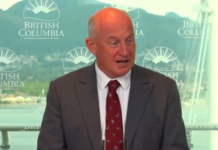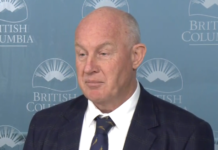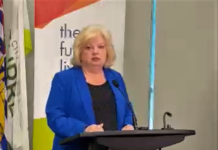THE British Columbia government has declared a provincial state of emergency to support the provincewide response to the novel coronavirus (COVID-19) pandemic.
Mike Farnworth, Minister of Public Safety and Solicitor General, made the declaration on Wednesday based on the recommendation from B.C.’s health and emergency management officials, after Dr. Bonnie Henry, B.C.’s provincial health officer, declared a public health emergency on Tuesday.
“Declaring a state of emergency is an important measure to support our provincial health officer and minister of health in swift and powerful response to the COVID-19 pandemic,” Farnworth said. “We are working with partners across government and industry to co-ordinate emergency response efforts, and we won’t hesitate to use the tools available to us to keep people safe.”
Declaring a state of emergency allows the Province, through the minister, to implement any provincial emergency measures required with access to land and human resource assets that may be necessary to prevent, respond to or alleviate the effects of an emergency. This includes securing the critical supply chains to make sure people have access to essential goods and services, and that infrastructure necessary in a response is readily available.
The state of emergency is initially in effect for 14 days, once issued, and may be extended or rescinded as necessary. The state of emergency applies to the whole province and allows federal, provincial and local resources to be delivered in a co-ordinated effort.
As House Leader, Farnworth is also working to resume the legislature to complete urgent government business to expedite government’s response to COVID-19.
“We are all working together and introducing these powers to protect our people, our health system and our economy,” said Adrian Dix, Minister of Health. “These are temporary measures that will help us immensely in the long term. I encourage British Columbians to respect the situation as it stands and remember that each of us has an individual responsibility and civic duty to look out for each other by complying with all emergency orders.”
The Province has created 1 888 COVID-19 to connect British Columbians needing non-medical information about COVID-19. This includes the latest information on travel recommendations and social distancing, as well as access to support and resources from the provincial and federal governments. 1 888 COVID-19 is available seven days a week, from 7:30 a.m. to 8 p.m. in 110 languages. The 811 number is also in place for medical-related COVID-19 questions.
Quick Facts:
- Declarations of provincial states of emergency may be issued by the minister responsible under the Emergency Program Act.
- The provincial government can extend the period of a declaration made by the minister responsible for further periods of time.
- During the 2017 wildfire season, B.C. was in a provincial state of emergency for 10 weeks, from July 7 to September 15.
- The last provincial declaration of state of emergency was issued in August 2018, also to deal with wildfires.
Emergency Program Act and Public Health Act
Emergency Program Act
- This act provides the legislative framework to manage disasters and emergencies in B.C.
- the minister of public safety and solicitor general or the lieutenant governor in council may declare a provincial state of emergency for no more than 14 days, if extraordinary power under the act is required. This period can be extended beyond 14 days by the lieutenant governor in council.
- Declaring a provincial state of emergency allows the minister to:
- implement a provincial emergency plan or measures;
- authorize or require a local authority to implement a local emergency plan or measures;
- acquire or use any land or personal property considered necessary to respond to the emergency;
- authorize or require any qualified person to provide assistance to others to respond to the emergency;
- control or prohibit travel to or from any area of B.C.;
- provide for the restoration of essential facilities and the distribution of essential supplies;
- provide, maintain, and co-ordinate emergency medical, welfare and other essential services in B.C.;
- cause the evacuation of persons and the removal of livestock, animals and personal property from any area of B.C. affected by the emergency, and make arrangements for their adequate care and protection;
- authorize the entry into any building or on any land, without warrant, by any person in the course of implementing an emergency plan, if the minister considers necessary;
- cause the demolition or removal of any trees, structures or crops, if the minister considers necessary;
- construct something that the minister considers necessary to respond to the emergency; and
- procure, fix prices for, or ration food, clothing, fuel, equipment, medical supplies or other essential supplies and the use of any property, services, resources, or equipment within any part of B.C.
Public Health Act
- This act provides a framework for managing current and emerging public health issues, including communicable disease prevention and control, health promotion and protection.
- It gives the minister of health and public health officials important tools, including broad powers to issue orders necessary to respond to public health emergencies.
- A situation qualifies as a provincial public health emergency when at least two of the following conditions are met:
- The event could have a serious impact on public health;
- The event is unusual or unexpected;
- There is a significant risk of the spread of an infectious agent or a hazardous agent;
- There is a significant risk of travel or trade restrictions as a result of the regional event.
- The Public Health Act is more narrow than the Emergency Program Act, as it addresses health impacts for citizens rather than impacts on businesses, the environment or infrastructure.













